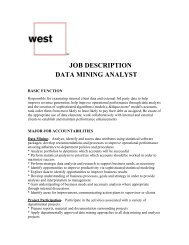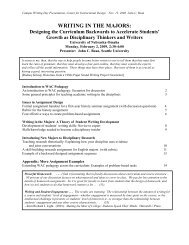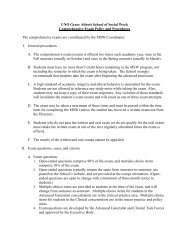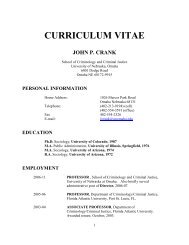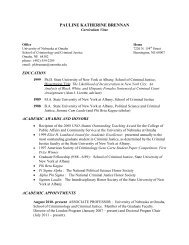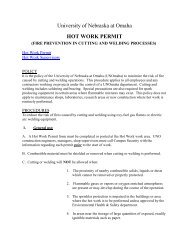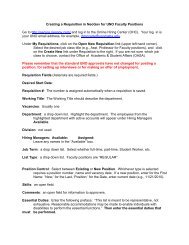The Solution to Global Warming
The Solution to Global Warming
The Solution to Global Warming
You also want an ePaper? Increase the reach of your titles
YUMPU automatically turns print PDFs into web optimized ePapers that Google loves.
Approaches <strong>to</strong> Solving <strong>Global</strong><br />
<strong>Warming</strong>
Approaches <strong>to</strong> Solving <strong>Global</strong><br />
<strong>Warming</strong><br />
Background<br />
<strong>The</strong> Idea<br />
Going through the steps<br />
Summary
<strong>The</strong> <strong>Solution</strong> <strong>to</strong> <strong>Global</strong> <strong>Warming</strong><br />
What is the solution <strong>to</strong> <strong>Global</strong> <strong>Warming</strong>?<br />
Biofuels such as ethanol?<br />
Mass transit replacing individual<br />
au<strong>to</strong>mobiles?<br />
Wind and solar power?<br />
Nuclear power?<br />
Carbon sequestration?<br />
None of these and possibly all of these.
<strong>The</strong> <strong>Solution</strong> <strong>to</strong> <strong>Global</strong> <strong>Warming</strong><br />
<strong>The</strong>re is no one solution <strong>to</strong> <strong>Global</strong><br />
<strong>Warming</strong>.<br />
<strong>The</strong>re is no one cause of <strong>Global</strong><br />
<strong>Warming</strong>.<br />
<strong>The</strong>re are still respected scientists<br />
who believe the current warming is<br />
part of the natural cycle.
Approaches <strong>to</strong> Solving <strong>Global</strong><br />
<strong>Warming</strong><br />
But what if the <strong>Global</strong> <strong>Warming</strong><br />
skeptics are right?<br />
We are still nearing the peak of<br />
crude oil production and worldwide<br />
demand continues <strong>to</strong> increase.<br />
We are using our resources at an<br />
unsustainable rate.
Approaches <strong>to</strong> Solving <strong>Global</strong><br />
<strong>Warming</strong><br />
We can’t take the sprinter’s view of<br />
using our resources.<br />
We’re in a marathon – we<br />
can’t deplete our<br />
resources and have<br />
nothing for the end of the<br />
race (or <strong>to</strong> pass on <strong>to</strong><br />
future generations).
Approaches <strong>to</strong> Solving <strong>Global</strong><br />
<strong>Warming</strong><br />
So what can we do?<br />
You as the major energy consumer<br />
of the world can have a huge impact.
Per Capita Electricity Consumption<br />
Author: Frank van Mierlo. Graph was produced from data in the 2006 Key World Energy Statistics from the<br />
International Energy Agency.
Your actions will:<br />
have twice the impact of a person in England or<br />
South Korea (and twice the CO 2 emissions)
Your actions will:<br />
have 8 times the impact of a person in China. (5<br />
times the CO 2 emissions.)
Your actions will:<br />
have 29 times the impact of a person in India. (19<br />
times the CO 2 emissions.)
Approaches <strong>to</strong> Solving <strong>Global</strong><br />
<strong>Warming</strong><br />
“Stabilization Wedges: Solving the<br />
Climate Problem for the next 50<br />
Years with Current Technologies” S.<br />
Pacala and R. Socolow, 2004 Science<br />
305 968-972
Approaches <strong>to</strong> Solving <strong>Global</strong><br />
<strong>Warming</strong><br />
In this paper Pacala and Socolow present<br />
a set of wedges each of which represents<br />
a way <strong>to</strong> offset 1 billion <strong>to</strong>ns of carbon<br />
emissions per year by 2054.<br />
<strong>The</strong> authors assume the process currently<br />
is unused, but the application will be<br />
increased linearly over the next 50 years.
Modified figure from S. Pacala and R. Socolow, 2004 Science 305 968-972<br />
Stabilization of carbon emissions at<br />
current levels – need 7 wedges
More “wedges” could be applied <strong>to</strong> reduce<br />
emissions further – can adjust <strong>to</strong> meet<br />
priorities.<br />
Modified figure from S. Pacala and R. Socolow, 2004 Science 305 968-972
Application of some “wedges” may<br />
decrease the effectiveness of<br />
others.<br />
Modified figure from S. Pacala and R. Socolow, 2004 Science 305 968-972
All the wedges represent current<br />
technologies.<br />
Modified figure from S. Pacala and R. Socolow, 2004 Science 305 968-972
I. Efficiency and Conservation<br />
1. Double au<strong>to</strong>mobile fuel efficiency<br />
(that’s less than 2% increase in fuel<br />
efficiency per year)<br />
– Buy a more efficient vehicle (when you can)<br />
http://www.<strong>to</strong>yota.com/prius/exterior.html and asmartcar.com<br />
http://www.caranddriver.com/carmodel/hummer-h3.htm
I. Efficiency and Conservation<br />
2. Decrease reliance on cars<br />
(same fuel efficiency, but cut use by 50%)<br />
Walk, ride or at least be smarter with your<br />
trips.<br />
http://en.wikipedia.org/wiki/Walking www.Metroareatransit
I. Efficiency and Conservation<br />
ftp://ftp.sunet.se/pub/pictures/tv.film/Muppet_Show/kermit.gif
I. Efficiency and Conservation<br />
3. Increase efficiency in buildings<br />
(especially in developing countries)<br />
Do what you can <strong>to</strong> make your living space<br />
more efficient – insulate, turn off lights,<br />
computers, etc.<br />
http://www.boldstarinfrared.com/homeimages.html<br />
www.remax.com (a house in omaha)<br />
http://www.unomaha.edu/enotes/2006/0119.php
I. Efficiency and Conservation<br />
4. Increase coal power plant<br />
efficiency by 50%<br />
http://en.wikipedia.org/wiki/Fossil_fuel_power_plant
II. Decarbonization of Electricity<br />
and Fuels<br />
5. Substitute natural gas for coal.<br />
Carbon emissions are about half those of<br />
coal plants.<br />
Increase use 4-fold<br />
http://en.wikipedia.org/wiki/Fossil_fuel_power_plant
II. Decarbonization of Electricity<br />
and Fuels<br />
6. Carbon sequestration<br />
Capture power plant emissions and sequester<br />
underground.<br />
Support efforts <strong>to</strong> limit allowable CO 2 emissions.<br />
Chemical and Engineering News, Sept 24, 2007, Bette Hillman and Jeff Johnson
II. Decarbonization of Electricity<br />
and Fuels<br />
7. Carbon sequestration from<br />
hydrogen plants<br />
http://www.getenergysmart.org/Files/<br />
HydrogenEducation/6HydrogenProduction<br />
SteamMethaneReforming.pdf
II. Decarbonization of Electricity<br />
and Fuels<br />
8. Carbon sequestration from synfuel<br />
plants.<br />
Large scale production of<br />
synthetic fuel from coal (similar<br />
<strong>to</strong> current work in South Africa)<br />
http://sasol.inves<strong>to</strong>reports.com/sasol_mm_2006/html/sasol_mm_2006_9.php
II. Decarbonization of Electricity<br />
and Fuels<br />
9. More nuclear fission power plants<br />
Roughly a doubling of current nuclear power<br />
use worldwide<br />
Seriously consider pros and cons.<br />
http://wesupportlee.blogspot.com/2006/10/m<br />
ajor-renovations-at-fort-calhoun.html
II. Decarbonization of Electricity<br />
and Fuels<br />
10. More wind generated electricity<br />
Assume turbine operate at 1/3 peak capacity.<br />
Increase about 50 times current capacity.<br />
Requires land mass about equal <strong>to</strong> 3% of U.S.<br />
http://www.nytimes<br />
.com/2006/08/02/u<br />
s/02wind.html; of<br />
wind farm in Kansas
II. Decarbonization of Electricity<br />
and Fuels<br />
11. Solar power (pho<strong>to</strong>voltaic)<br />
Increase about 700 times current capacity.<br />
This requires less than one tenth the land<br />
needed for the wind “wedge”<br />
http://www.soultek.com/blog/labels/solar%20powe<br />
r.html<br />
http://www.evworld.com/article.cfm?s<strong>to</strong>ryid=856
II. Decarbonization of Electricity<br />
and Fuels<br />
12. Renewable Hydrogen<br />
Use Wind or Solar electricity for electrolysis<br />
of water <strong>to</strong> make hydrogen fuel for vehicles.<br />
http://hydrogencommerce.com/ind<br />
exa2.htm
II. Decarbonization of Electricity<br />
and Fuels<br />
13. Biofuels<br />
If ethanol, need <strong>to</strong><br />
increase<br />
production about<br />
50-fold<br />
Would require an<br />
area equal <strong>to</strong> 1/6<br />
current cropland.<br />
(About 10 times<br />
the land<br />
requirement for a<br />
wind “wedge”.)<br />
National Geographic Oc<strong>to</strong>ber 2007
III. Natural Sinks<br />
14. Forest Management<br />
Reduce the rate tropical deforestation so it is zero in<br />
50 years.<br />
Reforestation of some tropical and temperate areas<br />
Pho<strong>to</strong> © Mark Godfrey/TNC
III. Natural Sinks<br />
15. Agricultural soils management<br />
Adopt conservation tillage so agricultural<br />
land is not tilled. (Decreasing release of<br />
carbon from the soil <strong>to</strong> the atmosphere.)<br />
Conservation tillage would have <strong>to</strong> be<br />
increased about 10-fold.<br />
http://www.agry.purdue.edu/cti/images/
Approaches <strong>to</strong> Solving <strong>Global</strong><br />
Summary<br />
<strong>Warming</strong><br />
– <strong>The</strong>re is no one solution <strong>to</strong> address<br />
carbon dioxide release or sustainable<br />
energy production.
<strong>The</strong> <strong>Solution</strong> <strong>to</strong> <strong>Global</strong> <strong>Warming</strong><br />
Summary<br />
– Employ<br />
best practices <strong>to</strong> conserve energy,<br />
apply current technologies <strong>to</strong> energy<br />
generation and<br />
increase biomass through better land<br />
management<br />
Can help mitigate carbon emissions<br />
and propel us <strong>to</strong>ward sustainable<br />
energy production.
<strong>The</strong> <strong>Solution</strong> <strong>to</strong> <strong>Global</strong> <strong>Warming</strong><br />
YOU can help more than most any<br />
other individuals on this planet.<br />
Start with conservation<br />
– You can eliminate a lot of waste.<br />
– Support renewable energy.<br />
We need <strong>to</strong> use our energy wisely so<br />
we can finish the race!
<strong>The</strong> <strong>Solution</strong> <strong>to</strong> <strong>Global</strong> <strong>Warming</strong><br />
What will you do??




